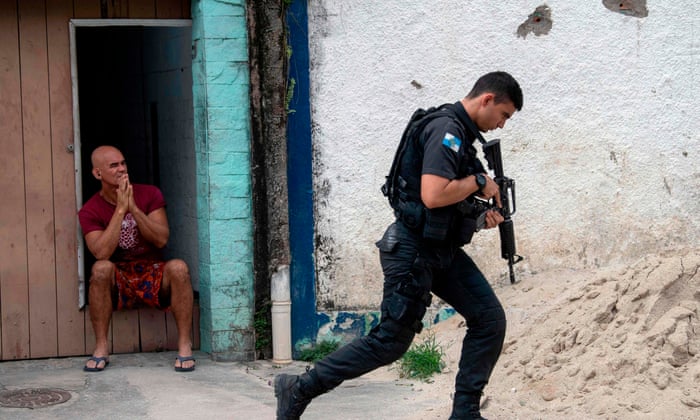Criminal Chaos in Rio de Janeiro
"Military-style security operations that leave a trail of death in poor neighborhoods do not enhance public security. On the contrary, these killings make communities fear the police and much less likely to collaborate with the police in the fight against crime."
"The mission of the police is to protect people, including those who live in poor neighborhoods. The excessive use of lethal force puts everyone at risk."
Daniel Wilkinson, Americas managing director, Human Rights Watch
“I think we are facing a great defeat of this civilizing project. For us and some of the more open-minded sectors of the police, the Pacifying Police Unit (UPP) program was an opportunity to change the security model—leaving behind the old model of confrontation and trying to turn towards a protection-based model, aiming at harm reduction and minimizing confrontations."
"This didn’t happen and now we’re seeing a cyclic return to old policies of confrontation."
Ignacio Cano, coordinator, Violence Analysis Laboratory, Rio de Janeiro State University (UERJ)
 |
| Rio de Janeiro state has registered a record number of five people killed a day on average during police operations in the first quarter of the year. Photograph: Mauro Pimentel/AFP/Getty Images |
Brazil, in the state of Rio de Janeiro, appears to be taking a page out of Rodrigo Duterte's military/police instructions to kill on sight as a remedy for the pervasive drug-crime culture in the Philippines. During the first four months of 2019, police in Rio de Janeiro shot to death 558 people -- representing the highest number of police killings since records began being kept by the state twenty years earlier.
Years of state policies that reduced police killings have been set aside with the determination of the new government to put an end to the trafficking and violence that has contributed to a political crisis and economic decline. Since 2014, criminal gangs have responded to a vacuum by reclaiming lost territory where across Brazil violence has exploded; the evidence seen in over 51,500 people killed in 2018, a staggering number of deaths.
According to state statistics in response to that situation, police in Rio de Janeiro have themselves killed a growing number of those they consider criminals, increasing to a high of 1,538 in 2018. In October, Brazilians voted in a new government, supporting candidates promising to fight violence with violence. Gun ownership rules were relaxed and police were given permission to fire on armed suspects. Since then, close to five killings a day have taken place.
Wilson Witzel, Rio de Janeiro's new governor, points to a drop in homicides as justification of an approach that is working. Police were promised greater leeway to kill suspected criminals by President Jair Bolsonaro, who had stated that a "good criminal was a dead criminal", sounding quite like the Philippines' Duterte. As for Governor Witzel, a former federal judge "We'll dig graves", he said when a question arose of a shortage of prison space for criminals.
Snipers, the governor stated, were gunning down armed suspects who "have to be lethally neutralized". But it is the suspicion of extrajudicial killings that is motivating criticism against the police. State representative Renata Souza urged the United Nations and the Organization of American States to investigate the situation, on the basis that "Summary executions are being carried out in favelas and other peripheral areas."
A task force was created in 2014 by the state prosecutor's office, to investigate allegations of this nature and since then police have been responsible for killing over four thousand people. There were 72 officers charged with homicide. At least 19 of that number have been acquitted, and none of the accused have been placed in prison. According to a leader of the task force, the team has a crushing workload, struggles with deficient forensic investigations and attempts to cope with witnesses who fear retaliation.
In Rio de Janeiro districts were settled by squatters decades ago and are controlled by drug traffickers and paramilitary groups. In the Fallet-Fogueteiro district on February 8, a shootout occurred as an elite police squad rumbled up a hill and suspected traffickers scrambled into a house where they removed their shirts as a gesture understood to represent surrender. Despite which police opened fire, leaving nine men dead on the ground, and four others dead outside the house.
"They didn't come to take them into custody. They came to kill", charged Tatiana Antunes de Carvalho, mother of a 21-year-old student who had been among those shot. Another operation took place in early May when the police shot down from a helicopter leaving eight people they targeted dead in the Complexo de Mare favela. An elderly woman witnessed two men surrendering in an alley. "My order is to kill", she heard an officer respond as they were shot, along with two others on a terrace.
"Confrontation generates an unsafe environment, mental illness and stress for police officers and residents" commented Roberto Sa, who served in an elite police unit earlier in his career, overseeing security policy in the state from 2016 to 2018.
 |
| A police operation left 13 dead in the Fallet-Fogueteiro district. EPA Photo: Marcello Sayao |
Labels: Brazil, Crime, Drug Cartels, Police

<< Home